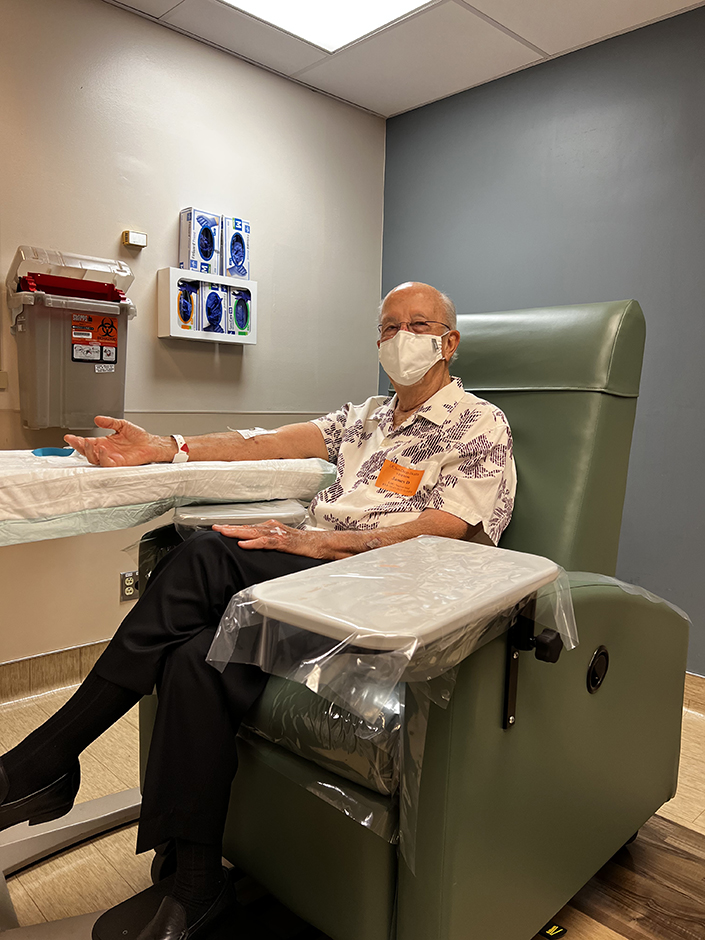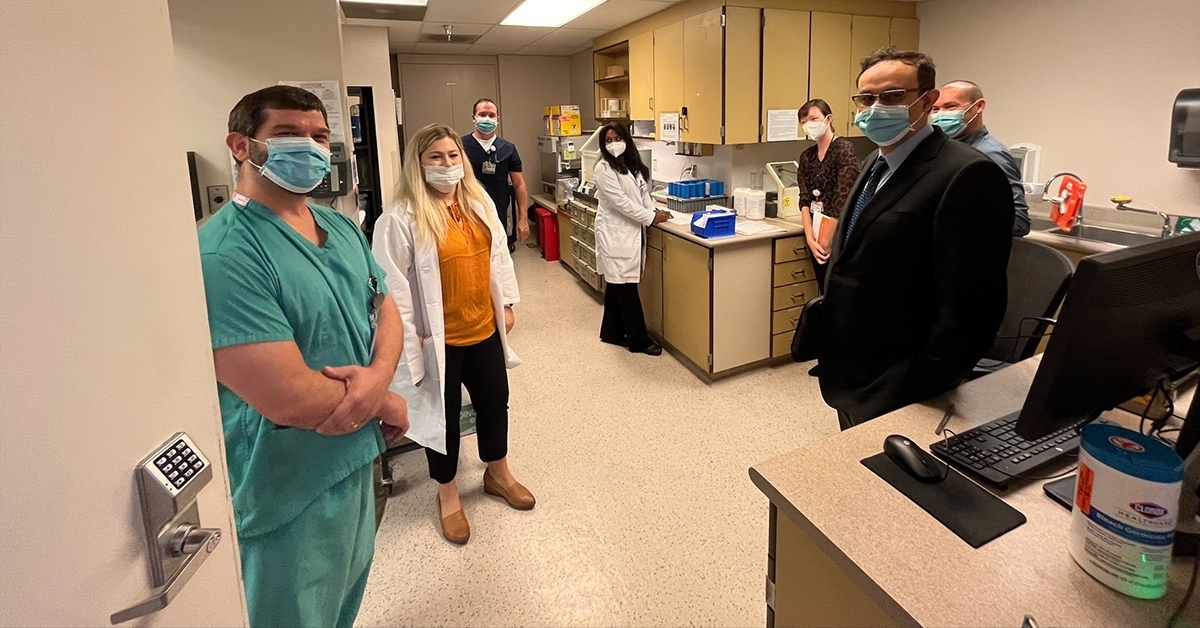Patient First in Region to Receive New Treatment for Advanced Prostate Cancer
Novel drug travels through body and uses targeted radiation to kill prostate cancer cells
Story by:
Published Date
Story by:
Topics covered:
Share This:
Article Content
UC San Diego Health is the first hospital system in the region to offer a novel treatment option for patients with prostate cancer that has spread throughout the body and has not responded to other therapeutics.
In 2004, upon Jim Duvall’s completion of service in the U.S. Army, college and a successful business career, he was diagnosed with prostate cancer. Shortly thereafter, he underwent surgery to treat the disease. However, three years later, it was discovered the cancer had spread to his bones. Duvall has gone through several treatments, including chemotherapy and radiation.
“There is no magic potion to cure my cancer and my physicians were very clear about this, but I have two kids and four grandkids, and I want to hang out with them a little longer,” said Duvall.
After managing prostate cancer for nearly 20 years, Duvall, age 80, transferred his care to UC San Diego Health. He was the first patient in the region to receive a new treatment for advanced prostate cancer.
“I was so grateful to be considered for this treatment,” said Duvall.

The FDA-approved drug, called Pluvicto (lutetium Lu 177 vipivotide tetraxetan), is a new radiation pharmaceutical that is administered through injection or infusion. The drug travels throughout the body and targets cancer cells with the PSMA biomarker, a protein found on most prostate cancer cells. Radiation is then released to damage and kill the cancer cells.
The drug specifically targets progressive, PSMA positive, metastatic (cancer that has spread) castration-resistant prostate cancer. Studies show it can extend the lives of people with this aggressive form of prostate cancer, even in the late stages.
“This is a groundbreaking clinical advancement for our prostate cancer patients, like Mr. Duvall. It is a significant step forward in the evolution of precision radioligand therapy for patients,” said Rana McKay, MD, medical oncologist at UC San Diego Health.
“Although the treatment landscape for advanced prostate cancer continues to evolve, there is a high unmet need for additional treatment options for these patients. This treatment may help patients live longer, which is tremendous.”
Prostate cancer is the second leading cause of cancer death for men in the United States. Men with prostate cancer have several options for fighting the disease, including hormone therapy, chemotherapy, radiation and surgery. However, if these treatments do not stop the progression of the cancer, there are few other options.
“Without the knowledge, dedication and compassion of Dr. McKay and my entire medical team, I’m not sure I would be here today to share my story,” said Duvall.
Treatments, such as chemotherapy, can come with many unpleasant side effects.
In contrast, the new drug targets PSMA, which is largely expressed on tumor cells. This can mean fewer side effects like nausea, vomiting and hair loss.
“As the only academic medical center in the region, we are always excited to offer innovative treatments to our patients, particularly those who have exhausted other options,” said Christopher Kane, MD, urologist and CEO, UC San Diego Health Physician Group.
“Advanced prostate cancer is challenging to treat, but survival rates have improved in recent years. We anticipate that this treatment will make a meaningful difference in our patients’ lives.”
Duvall received his first dose of Pluvicto at UC San Diego Health in early September. In total, he will receive six doses set apart every six weeks.
Administering the treatment to UC San Diego Health patients requires a multi-disciplinary approach with teams in oncology, urology, radiation oncology, radiology, nuclear medicine, pharmacy, nursing and integrative medicine teams.
“Our nuclear medicine team is honored to be at the forefront of delivering theragnostic care. We look forward to continuing to bring emerging innovative diagnostic and treatment tools to best serve our patients,” said K. Elizabeth Hawk, MD, PHD, interim chief of nuclear medicine at UC San Diego Health.
“The patients who have received this treatment have expressed excitement and gratitude for this significant advancement. It has given them renewed hope,” said Sindu Alexander MD, nuclear medicine physician at UC San Diego Health.
Duvall is doing well and staying active. He walks four to five days a week and is living a quality life during his treatment.
“There are not enough accolades for everyone involved in this new treatment. I truly feel like I will now be able to spend many more special moments with my family,” said Duvall.
According to the 2022-2023 U.S. News & World Report “Best Hospitals” survey, UC San Diego Health is ranked 20th for Cancer, among the nation’s top 50 programs, out of more than 4,500 hospitals nationwide. Moores Cancer Center at UC San Diego Health is the only National Cancer Institute-designated Comprehensive Cancer Center in San Diego County, the highest possible rating for a U.S. cancer center.
“Although the treatment landscape for advanced prostate cancer continues to evolve, there is a high unmet need for additional treatment options for these patients. This treatment may help patients live longer, which is tremendous.”
Stay in the Know
Keep up with all the latest from UC San Diego. Subscribe to the newsletter today.




